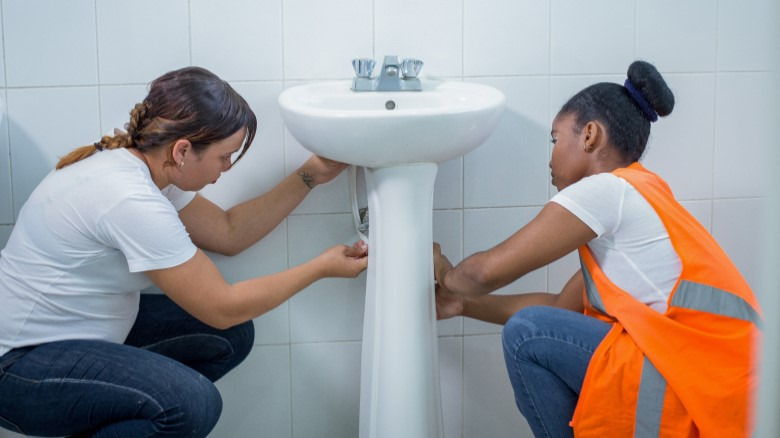Women Electricians, Plumbers, Entrepreneurs: The new faces of the Caribbean workforce
Reproduced under courtesy of The World Bank
Jennyfer Blandino just turned 21. She lives in the Dominican Republic. Like all woman of her age, she faces a challenge. The career choices she makes will affect not only her professional growth and economic security, but also her work-life balance.
Women today have only three-quarters of the legal rights that men have, according to a new index released by the World Bank. This limits their ability to get jobs, start businesses and make economic decisions that are best for them and their families. They also earn 20 percent less than men.
For Jennyfer and many other women in the Caribbean and across the world, removing barriers that prevent them from leading companies and having the same economic opportunities as men is key for them and their families, and it will benefit society. No country can achieve its full potential until all its people can accomplish theirs.
Meet some of the entrepreneurial women who have emerged as the force for change.
“I would never have imagined being a plumber.”

Jennyfer and 30,000 other young people from the Dominican Republic decided to join a recent vocational training session offered by Progresando Unidos, a social protection program supported by the World Bank. Jennyfer opted for the plumbing class, which included technical and entrepreneurial courses as well. Jennyfer smiles when she sees herself as a plumber. “I really thought that plumbing was only for men.”
These traditionally male-dominated jobs represent a great opportunity for inserting women into the Dominican workforce, as they only account for 5 percent of the jobs that women hold. Jennyfer says her new plumbing skills are opening up a new path for her: “I can now start my own business.”
MULTIMEDIA
“When we train a woman, we train a nation.”

Rita Hilton started her food processing company in Jamaica 30 years ago. At first, Carita Jamaica only employed two people. Now Rita supervises over 30 workers, most of them women from the vulnerable surrounding areas. The mentorship and technical support Rita received in marketing and finance through the Women Innovators Network in the Caribbean Project and the financial support provided by the Foundation for Competitiveness and Growth Project helped put Carita Jamaica on the road to success.
She has faith in her company and its capacity to create a “really valuable source of employment” that will generate lots of opportunities for the general development of women in the industry. “When we train a woman, we train a nation,” she says, proudly. In Jamaica, only 29.5 percent of medium-sized companies like Carita are female-led organization, and this rate is only 8.3 percent when it comes to bigger companies.
Striving as an entrepreneur

“To strive as an entrepreneur, you need clear objectives and, above all, strong discipline,” says Marielle Jacques, a thriving Haitian entrepreneur in the business district of Tabarre, Port-au-Prince. “I am proud of what I have created in my 30-year career. Now my company employs 14 people and I managed to open a new branch in a small town.” Marielle is 52 years old. She often travels far from her home island to find the competitive household products that she will be able to sell in her shops.
According to the World Bank Global Findex 2017, only 18 percent of women in Latin America and the Caribbean have access to credit. Marielle was able to obtain a loan from a commercial bank, to open two shops and grow her business. She got the loan with help from an IFC advisory program that supports financial institutions in providing access to finance to small and medium enterprises (SMEs). In Haiti, most SMEs are led by women.
“I clearly see a future.”

When Tracy Stewart, a mother of six, saw a newspaper advertisement of the Sint Maarten Training Foundation offering a course in electrical skills, she recognized an opportunity to get ahead. “I had been a waitress for many years and became unemployed after hurricane Irma. This class was something else and I know that the island needs skilled electricians. As a woman, I could sign up, so why not?”
For six months, she went to daily class diligently, no easy feat for a mother with baby twins at home. “There were sometimes challenges with the babies, but with family support we managed. I want to continue my education to become a highly skilled electrician.” Tracy is one of the 900 students who have received vocational training to sharpen their job skills and get back into the job market following Hurricane Irma. Over 60 percent of the students are women. The program started as an initiative of the island’s hotel industry and is supported by the Sint Maarten Recovery, Reconstruction and Resilience Trust Fund.
These stories demonstrate that when women work and are better paid, they can make a greater contribution to the economy and society.
“Jennyfer and many other Caribbean women entrepreneurs are showing that change is real, and change is happening,” said Anabela Abreu World Bank Country Director in Haiti.
Tahseen Sayed, Country Director for the Caribbean, added: “When offered the same choices and opportunities, women indeed excel and lead the way. We are proud to have played a small part in their journeys.”
OECS Communications Unit
